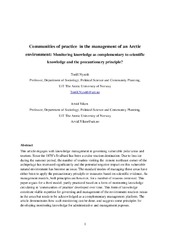| dc.contributor.author | Nyseth, Torill | |
| dc.contributor.author | Viken, Arvid | |
| dc.date.accessioned | 2016-02-19T10:34:08Z | |
| dc.date.available | 2016-02-19T10:34:08Z | |
| dc.date.issued | 2015-06-03 | |
| dc.description.abstract | This article engages with knowledge management in governing vulnerable polar areas and
tourism. Since the 1870’s Svalbard has been a cruise tourism destination. Due to less ice
during the summer period, the number of tourists visiting the remote northeast corner of the
archipelago has increased significantly and the potential negative impact on this vulnerable
natural environment has become an issue. The standard modes of managing these areas have
either been to apply the precautionary principle or measures based on scientific evidence. As
management models, both principles are however, for a number of reasons contested. This
paper argues for a third model, partly practiced based on a form of monitoring knowledge
circulating in 'communities of practice' developed over time. This form of knowledge
constitute viable expertise for governing and management of the environment-tourism nexus
in the areas but needs to be acknowledged as a complementary management platform. The
article demonstrates how such monitoring can be done, and suggests some principles for
developing monitoring knowledge for administrative and management puposes. | en_US |
| dc.description | This is accepted manuscript version. Published version available at <a href=http://dx.doi.org/10.1017/S003224741500039X>http://dx.doi.org/10.1017/S003224741500039X</a> | en_US |
| dc.identifier.citation | Polar Record, Volume 52 Issue 01, January 2016, pp 66-75 | en_US |
| dc.identifier.cristinID | FRIDAID 1258365 | |
| dc.identifier.doi | 10.1017/S003224741500039X | |
| dc.identifier.issn | 0032-2474 | |
| dc.identifier.uri | https://hdl.handle.net/10037/8520 | |
| dc.identifier.urn | URN:NBN:no-uit_munin_8092 | |
| dc.language.iso | eng | en_US |
| dc.publisher | Cambridge University Press | en_US |
| dc.rights.accessRights | openAccess | |
| dc.subject | VDP::Social science: 200 | en_US |
| dc.subject | VDP::Samfunnsvitenskap: 200 | en_US |
| dc.title | Communities of practice in the management of an Arctic environment: monitoring knowledge as complementary to scientific knowledge and the precautionary principle? | en_US |
| dc.type | Journal article | en_US |
| dc.type | Tidsskriftartikkel | en_US |
| dc.type | Peer reviewed | en_US |


 English
English norsk
norsk